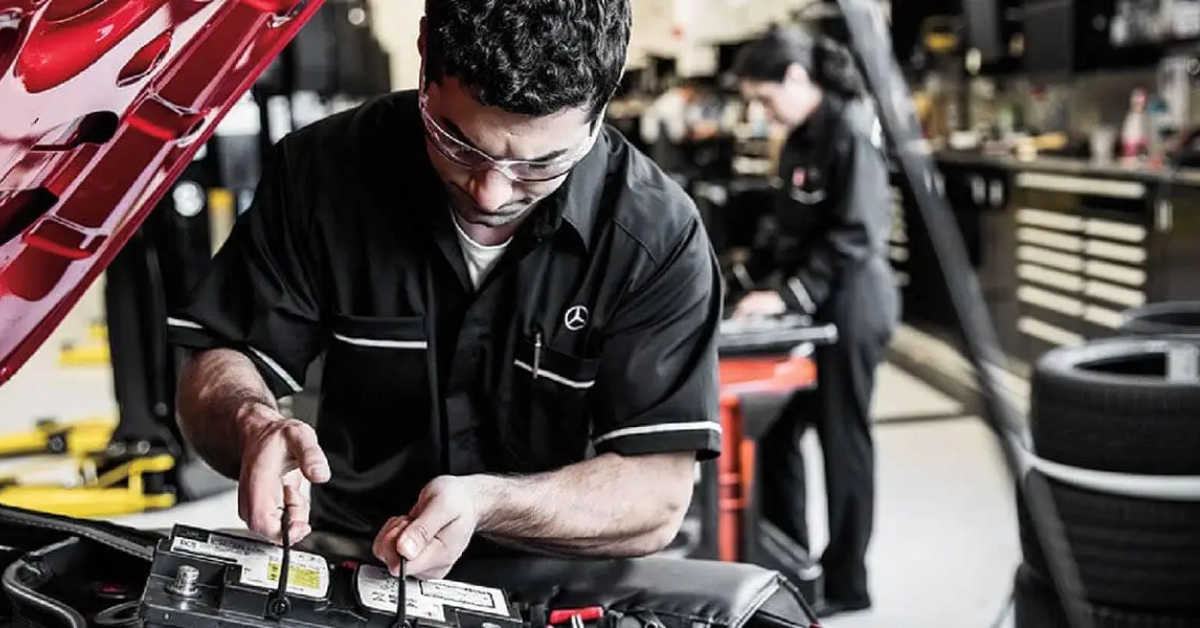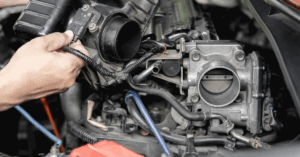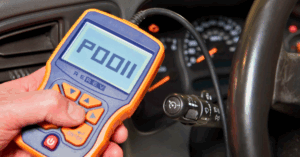Owning a Mercedes means embracing luxury, performance, and prestigious standards. The Mercedes-Benz B9 service is a specialized maintenance designed to keep your vehicle in top-notch condition and ensure its performance remains reliable.
It involves a thorough check-up of vital components like oil changes, brake fluid checks, spark plug replacements, air filter inspections, wiper blade replacements, and ATF fluid changes. This comprehensive approach guarantees your car’s health, smooth driving, and long-term longevity.
When the dashboard indicator displays the B9 service message, it’s a reminder to address these essential components to maintain the luxury and prestige of your Mercedes-Benz. By following this checklist, you not only prevent potential issues but also enjoy a seamless driving experience that reflects the world-class design of your car.
What Is A Mercedes B9 Service?
The Mercedes B9 service is a comprehensive inspection designed to maintain your Mercedes-Benz’s performance, durability, and lifespan. It includes essential checks on the engine, transmission, brakes, and other components to protect your car’s health and address potential issues. This tailored one-package combination ensures smooth, reliable driving and keeps your vehicle in top condition.

What Items Are Included in the Mercedes B9 Service?
The Mercedes B9 service involves essential items like oil and filter replacement, brake fluid change, spark plugs replacement, air filter replacement, wiper blade inspection, and ATF (Automatic Transmission Fluid) replacement. These tasks are vital for maintaining the health, performance, and longevity of your vehicle, ensuring smooth operation and safety.
Oil and Filter Replacement
The first step is replacing the old oil with new oil, which keeps the engine running smoothly and prevents overheating. The mechanic also replaces the filter, ensuring the engine remains clean and well-lubricated for optimal performance. Using durable, high-quality oil extends the vehicle’s lifespan and prevents wear.
Brake Fluid Change
Brake fluid is a hydraulic system essential that transfers force to the brakes, ensuring a complete stop. During the B9 service, the technician removes old fluid, checks for moisture or contaminants, and adds fresh fluid to maintain safety and reliability. This prevents brake effectiveness from decreasing over time.
Spark Plugs Replacement
Spark plugs ignite the air/fuel mixture in the engine, powering the vehicle’s combustion chamber. They should be replaced every 30,000–100,000 miles to maintain efficiency. High-quality plugs ensure smooth operation, better fuel economy, and protect your engine from performance loss.

Air Filter Replacement
An air filter keeps dust and dirt from entering the engine, ensuring only clean air reaches the combustion chamber. Replacing it every 90 days or 3 months helps keep the engine cooler and maintains its efficiency. Clean filters improve fuel efficiency and protect the engine from clogs.
Wiper Blades Inspection/Replacement
Wiper blades are checked for wear, scratches, or breaks, especially after foggy, rainy, or dusty conditions. If worn out, they are replaced to ensure visibility and safety while driving. This task ensures a secure driving experience, even in extreme weather.
ATF Replacement
ATF (Automatic Transmission Fluid) is replaced to ensure smooth gear shifts and protect the transmission system from wear. It’s suggested every 30,000 to 60,000 miles for manual vehicles and up to 100,000 miles for automatic ones. This small investment extends your vehicle’s lifecycle and keeps performance optimal.
Cabin Air Purity Check for Comfort
Clean air inside your car is essential, and the cabin air filter ensures a dust-free environment. If clogged, it can reduce air quality and affect your driving experience, making this inspection a key step in ensuring comfort.

Tire Health for Better Safety
Tire inspections are vital for road safety. During the B9 service, technicians check tire pressure, tread wear, and may perform rotation to extend tire life, giving you better grip and stability on the road.
Battery Assessment to Avoid Surprises
No one wants their car to stall unexpectedly. The battery check ensures your car’s power source is in peak condition, reducing the risk of failure and ensuring reliability.
Coolant Optimization for Smooth Performance
The coolant system plays a critical role in regulating the engine’s temperature. By checking and replenishing coolant, the B9 service helps prevent overheating, improving engine efficiency and longevity.
Steering and Suspension for Comfortable Driving
Safe handling depends on the steering and suspension systems. The B9 service ensures these are thoroughly inspected, enhancing driving comfort and protecting against wear-related issues.
Exhaust System and Emissions Check

With stricter environmental regulations, your car’s exhaust system needs to work efficiently. A careful inspection during the B9 service ensures there are no leaks or clogs that could impact performance or emissions compliance.
Electrical Systems Verification for Peace of Mind
From dashboard indicators to lights, the electrical system ensures you’re always informed and visible. Technicians ensure these components work flawlessly, helping you stay safe and informed on the road.
Read More:
How To Make Ridgeline Drive More Comfort: Proven Tips
How long will a Car Run with a Bad Alternator?
Mercedes B9 Service Checklist
| Service Task | Purpose | Recommended Interval | Signs Service Is Needed |
|---|---|---|---|
| Oil and Filter Replacement | Keeps the engine lubricated, prevents overheating, and removes debris from engine oil. | Every 5,000-10,000 miles or as per your vehicle’s manual. | Reduced engine performance, dirty oil, or dashboard oil light. |
| Brake Fluid Change | Ensures proper braking performance by preventing fluid contamination and moisture buildup. | Every 2 years or 20,000 miles. | Spongy brakes, longer braking distances, or warning lights. |
| Spark Plug Replacement | Maintains efficient combustion and ensures smooth engine starts. | Every 30,000-100,000 miles (varies by type). | Difficulty starting, engine misfires, or decreased fuel efficiency. |
| Air Filter Inspection/Replacement | Ensures clean airflow to the engine for optimal performance and fuel economy. | Every 15,000-30,000 miles. | Reduced engine power, unusual noises, or decreased MPG. |
| Wiper Blade Inspection/Replacement | Provides clear visibility during adverse weather conditions. | Annually or as needed. | Streaks on the windshield or noisy/blurry wiper performance. |
| Automatic Transmission Fluid Replacement | Maintains smooth gear shifts and prevents transmission wear. | Every 30,000-60,000 miles. | Slipping gears, delayed shifts, or discolored fluid. |
Benefits of Regular Service B9
| Benefit | Explanation |
|---|---|
| Keeping the car running | Ensures your Mercedes stays reliable and smooth during routine use. |
| Increasing fuel efficiency | Proper maintenance optimizes the engine’s fuel economy, saving costs. |
| Extending engine life | Protects critical engine components, increasing the car’s lifespan. |
| Driving safer | Well-maintained brakes and systems improve safety on the road. |
| Prevent costly repairs | Early detection of issues avoids expensive repairs in the future. |
| System benefits | Keeps the car’s vital systems functioning efficiently for long-term reliability. |
| Improved performance | Ensures all components work together for a smoother driving experience. |
| Preserving luxury standards | Regular service retains the prestigious quality associated with owning a Mercedes-Benz. |
| Maintaining resale value | A well-maintained vehicle has higher market value when selling or trading in. |
| Environmental benefits | Properly functioning systems reduce emissions, aligning with environmental standards. |
| Comfort enhancement | Cabin air filters and suspension maintenance ensure a comfortable ride. |
| Optimized braking system | Ensures brakes are efficient and reliable, increasing confidence in emergency situations. |
What Is Mercedes B9 Service Cost?
| Factor | Description | Impact on Cost |
|---|---|---|
| Car Model | Newer Mercedes-Benz models typically require more advanced parts and specialized service. | Higher for newer models, ranging from $900 to $1,500. |
| Labor Rates | Skilled technicians with Mercedes certification often charge premium rates. | Depends on expertise; rates vary by service center. |
| Location | Regional differences in labor costs and parts availability affect pricing. | Varies; USA averages $700-$1,200, while UK can be higher. |
Why Is a Mercedes-Benz B9 Service So Expensive?
A Mercedes-Benz B9 service is expensive due to its reliance on expert care, extraordinary parts, and highly trained technicians. Mercedes-Benz, as a luxury automaker, prioritizes optimal performance by using genuine components and advanced diagnostic tools, which raise the overall cost. This level of maintenance ensures your car’s complexity is handled with precision and delivers peak performance.

Exclusive Image of Mercedes
As one of the top automakers in the world, Mercedes represents luxury and an exclusive image. Owners are willing to invest in preserving the brand’s reputation for excellence, which contributes to the service’s higher costs.
Expensive Tools and Gadgets
Maintaining a Mercedes requires advanced tools, computer systems, and scanners to inspect vehicles accurately and comprehensively. These gadgets are costly investments for mechanics, further driving up service costs.
Highly Trained Technicians
Mercedes-Benz techs undergo strict training, earn certifications, and acquire in-depth knowledge of the vehicle’s complexity. Their expertise ensures precise service, but their labor rates are naturally higher due to their specialized skills.

Expensive Auto Parts
Genuine auto parts used in B9 maintenance are of superior quality compared to aftermarket components. These special parts ensure your vehicle’s optimal performance, maintaining the brand’s outstanding standards.
When Should a B9 Service Be Done?
A Mercedes B9 service is typically performed at 180,000 miles or about 12 months after the last A9 service. The dashboard instrument cluster will display a B9 service due message, reminding the vehicle owner to schedule the next maintenance. Regular adherence to this schedule helps ensure long-term reliability.
Comparing Service B9 with Other Maintenance Services
The Mercedes-Benz B9 service stands out as a tailored maintenance package designed to keep vehicles running at peak performance. Unlike basic services like Service A, which occurs every 10,000 miles and focuses on essentials like oil replacement, B9 service delves deeper. It includes engine, transmission, and suspension inspections, addressing critical aspects for long-term health and reliability.
While other services like coolant flushes or brake pad replacements may be specific to certain needs, B9 service combines these under a comprehensive umbrella. It thrives on tailored care, ensuring that luxury standards are met, and your Mercedes-Benz functions optimally for years.
Tips to Make a Good Choice for B9 Service
Before booking a B9 service, check your local garage’s ratings and client reviews to ensure quality. Always confirm the total expense and keep extra money for any unexpected charges. Sharing your vehicle’s faults and driving experience with the mechanic helps them better analyze your car’s condition.

Ask for coupon codes or discounts available on service plans to save costs. Choosing a skilled Mercedes mechanic with a proven track record ensures you get value for money.
How Long Does a B9 Service Take?
The B9 service typically takes 2 to 5 hours, depending on the season and the number of clients waiting at the shop. During busy seasons, booking an appointment beforehand can save time. Vehicle maintenance tasks requiring detailed checks may take longer but ensure thorough care.
Service B9: DIY Vs. Professional
Performing a B9 service requires detailed vehicle knowledge, special tools, and technical expertise. A professional mechanic is trained to handle complex systems, reducing risks and ensuring precision. While DIY enthusiasts might attempt it, experts highly recommend professional service for optimal results.
Can I Do a B9 Service Myself?
If you have in-depth technical knowledge, the necessary tools, and experience with past DIY maintenance, you might attempt a B9 service. However, it’s always better to visit an accredited Mercedes repair center to ensure all tasks are completed to factory standards.
How to Reset B9 Service Notification on a Mercedes?
Resetting the B9 service notification doesn’t require an appointment. Follow the video guide or use the dashboard indicator menu to clear the warning. The process takes only a few minutes.
[su_youtube url=”https://youtu.be/6Xvo8nme7tM?si=Ce1-J3iUVmmDCLyK” title=”How to Reset B9 Service Notification on a Mercedes?”]
FAQS
What is service B9 on a Mercedes?
Service B9 is a scheduled maintenance package for Mercedes-Benz vehicles that includes essential tasks like oil changes, filter replacements, brake inspections, tire checks, and fluid level adjustments.
This service is performed at a specific interval and may vary depending on the model, year, and specific requirements of your vehicle. It ensures your car stays in top condition, maintaining performance and safety.
How much is a Mercedes B9 service?
The average cost of a B9 service for a Mercedes ranges from $700-$1500. The price can depend on factors such as the car model, location, and the dealership you choose. To get the exact cost, consult your local service center.
How to reset service warning light?
If the maintenance required light on your dashboard is on, you can follow these quick and easy steps to reset it yourself:
- Turn your car on, but do not start the engine.
- Use the controls to change the display on the dashboard to “TRIP A.”
- Switch off the car completely.
- Hold the “ODO/TRIP” button down while turning the ignition back on (without starting the engine).
- Keep holding the “ODO/TRIP” button for about 10 seconds until the light resets.
These simple steps ensure that the maintenance required light is cleared, giving you peace of mind. This method is a great way to save time and avoid a trip to the service center.
What is the service interval for Mercedes-Benz in KM?
For Mercedes-Benz vehicles, a routine maintenance service is recommended every 20,000 to 30,000 kms. This includes an engine oil check, filter replacement, and an examination of belts and hoses to keep the car running smoothly.
When to Change the Air Filter?
Most air filter manufacturers recommend replacing filters every 90 days or 3 months, especially in dusty or dry climates. Consult your vehicle expert or follow your Mercedes maintenance schedule for optimal results.
When to Change Spark Plugs?
Spark plugs should be replaced every 30,000 miles, though some extended-range plugs can last up to 100,000 miles. Driving habits and engine conditions can influence this schedule, so regular checks are essential.
When to Change Automatic Transmission Fluid?
For manual vehicles, replace transmission fluid every 30,000 to 60,000 miles. For automatic vehicles, the range increases to 60,000 to 100,000 miles. Replacing fluid early can prevent issues and ensure smooth gear shifts.

Mian Hashir is a passionate automotive enthusiast and the lead author at Car Garagee, a website dedicated to providing in-depth car reviews, maintenance tips, and the latest news in the automotive world. With years of experience in the industry, Hashir combines his technical knowledge with a love for cars to deliver insightful and engaging content. Whether you’re a car owner or a curious reader, Mian Hashir’s articles help readers make informed decisions, from choosing the right vehicle to understanding how to keep it in top condition.







